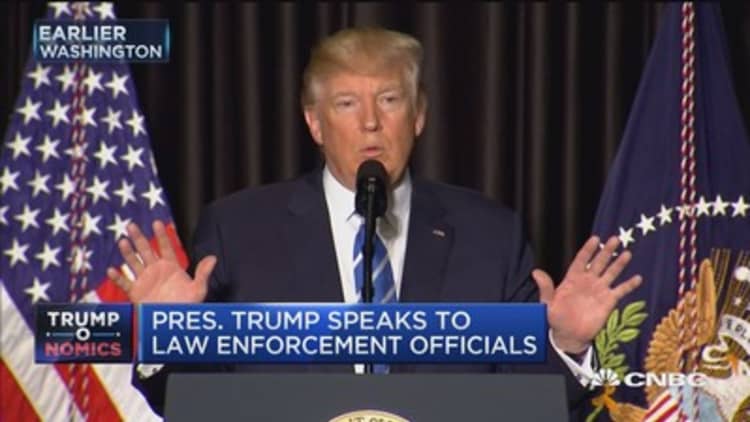
A defiant President Donald Trump took another swipe at the judicial branch on Wednesday, saying that the courts blocking his divisive immigration order "seem to be so political."
Trump started his remarks to a law enforcement conference by reading the law his administration believes underpins the measure, which has received the most backlash of any action he has taken in his young presidency. In the rambling opening to his speech, Trump urged a federal appeals court hearing arguments on the order's halt to agree with his administration.
"I have to be honest that if those judges wanted to, in my opinion, help the court in terms of respect for the court, they'd do what they should be doing," Trump told a joint conference of the Major County Sheriffs' Association and Major Cities Chiefs Association.
"Right now, we are at risk because of what happened."
A George W. Bush-appointed federal judge in the state of Washington previously suspended the order, which restricts travelers with visas from seven Muslim-majority countries from entering the U.S. for 90 days. It also stops refugee admissions for 120 days and indefinitely bars Syrian refugees.
Trump focused his criticism on the arguments made in the 9th U.S. Circuit Court of Appeals in San Francisco on Tuesday by lawyers for the state of Washington, which sued Trump's administration, arguing that the measure would harm its economy. The court will not decide on the legality of the order itself, but whether the lower court's suspension can stand.
Federal judges on Tuesday pushed back both on the administration's arguments that the measures were necessary to properly vet immigrants and the plaintiffs' contention that the order targeted Muslims specifically.
Trump's order signed late last month sparked confusion at airports and protests around the country. Criticism of the rollout focused on the detention of legal permanent residents, or green card holders, and accusations that it targeted Muslims, among other issues.
Trump argued Wednesday that the administration made the move hastily to prevent terrorism. His administration has repeatedly said it moved quickly to stop potential threats from "pouring in" to the U.S., though it has given no evidence to back an increased threat.
At Wednesday's conference, Trump read a section of the U.S. code that the administration has used as its legal underpinning for the order, peppering it with his own commentary. It outlines the president's ability to "by proclamation, and for such period as he shall deem necessary" suspend the entry of some aliens or impose "restrictions he may deem appropriate."
At one point, Trump said the law should have read "he or she," adding that "hopefully it won't be a she for at least another seven years."
"You can suspend, you can put restrictions, you can do whatever you want, and this is for the security of the country," Trump argued.
"Courts seem to be so political," he said.
Trump's comments about the judicial branch have prompted concerns that his administration will not respect its checks on its power. However, past presidents have also made comments dinging the courts.
Critics who have focused on the intent of Trump's order cite his campaign call for a temporary ban on Muslims entering the United States and Trump advisor Rudy Giuliani's comment last month that Trump wanted a "Muslim ban" and asked for "the right way to do it legally." The White House has repeatedly denied that the measure is a Muslim ban.
A decision from the appeals court is expected at any time.


